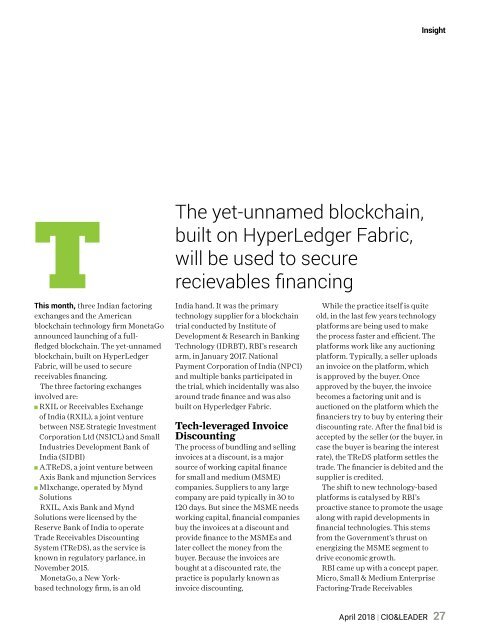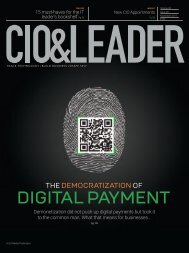CIO & LEADER-Issue-01-April 2018 (1)
You also want an ePaper? Increase the reach of your titles
YUMPU automatically turns print PDFs into web optimized ePapers that Google loves.
Insight<br />
T<br />
The yet-unnamed blockchain,<br />
built on HyperLedger Fabric,<br />
will be used to secure<br />
recievables financing<br />
This month, three Indian factoring<br />
exchanges and the American<br />
blockchain technology firm MonetaGo<br />
announced launching of a fullfledged<br />
blockchain. The yet-unnamed<br />
blockchain, built on HyperLedger<br />
Fabric, will be used to secure<br />
receivables financing.<br />
The three factoring exchanges<br />
involved are:<br />
RXIL or Receivables Exchange<br />
of India (RXIL), a joint venture<br />
between NSE Strategic Investment<br />
Corporation Ltd (NSICL) and Small<br />
Industries Development Bank of<br />
India (SIDBI)<br />
A.TReDS, a joint venture between<br />
Axis Bank and mjunction Services<br />
M1xchange, operated by Mynd<br />
Solutions<br />
RXIL, Axis Bank and Mynd<br />
Solutions were licensed by the<br />
Reserve Bank of India to operate<br />
Trade Receivables Discounting<br />
System (TReDS), as the service is<br />
known in regulatory parlance, in<br />
November 2<strong>01</strong>5.<br />
MonetaGo, a New Yorkbased<br />
technology firm, is an old<br />
India hand. It was the primary<br />
technology supplier for a blockchain<br />
trial conducted by Institute of<br />
Development & Research in Banking<br />
Technology (IDRBT), RBI’s research<br />
arm, in January 2<strong>01</strong>7. National<br />
Payment Corporation of India (NPCI)<br />
and multiple banks participated in<br />
the trial, which incidentally was also<br />
around trade finance and was also<br />
built on Hyperledger Fabric.<br />
Tech-leveraged Invoice<br />
Discounting<br />
The process of bundling and selling<br />
invoices at a discount, is a major<br />
source of working capital finance<br />
for small and medium (MSME)<br />
companies. Suppliers to any large<br />
company are paid typically in 30 to<br />
120 days. But since the MSME needs<br />
working capital, financial companies<br />
buy the invoices at a discount and<br />
provide finance to the MSMEs and<br />
later collect the money from the<br />
buyer. Because the invoices are<br />
bought at a discounted rate, the<br />
practice is popularly known as<br />
invoice discounting,<br />
While the practice itself is quite<br />
old, in the last few years technology<br />
platforms are being used to make<br />
the process faster and efficient. The<br />
platforms work like any auctioning<br />
platform. Typically, a seller uploads<br />
an invoice on the platform, which<br />
is approved by the buyer. Once<br />
approved by the buyer, the invoice<br />
becomes a factoring unit and is<br />
auctioned on the platform which the<br />
financiers try to buy by entering their<br />
discounting rate. After the final bid is<br />
accepted by the seller (or the buyer, in<br />
case the buyer is bearing the interest<br />
rate), the TReDS platform settles the<br />
trade. The financier is debited and the<br />
supplier is credited.<br />
The shift to new technology-based<br />
platforms is catalysed by RBI’s<br />
proactive stance to promote the usage<br />
along with rapid developments in<br />
financial technologies. This stems<br />
from the Government’s thrust on<br />
energizing the MSME segment to<br />
drive economic growth.<br />
RBI came up with a concept paper,<br />
Micro, Small & Medium Enterprise<br />
Factoring-Trade Receivables<br />
<strong>April</strong> 2<strong>01</strong>8 | <strong>CIO</strong>&<strong>LEADER</strong><br />
27














